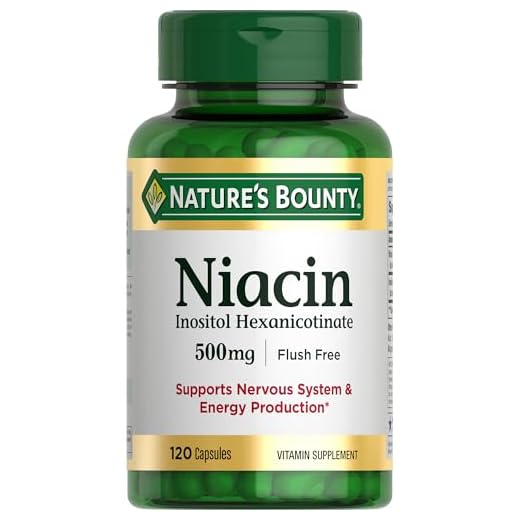







Yes, Vitamin B3, or niacin, can lower triglyceride levels effectively. When taken in therapeutic doses ranging from 1,000 to 4,000 mg, niacin may reduce triglycerides by 20-50%. It works by inhibiting the liver's production of triglycerides, leading to sustained reductions over time. Additionally, niacin can elevate HDL cholesterol, which further enhances heart health. However, it's essential to consult with your healthcare provider before starting niacin, as high doses may cause side effects such as flushing or liver complications. To learn about complementary strategies for managing triglycerides, you might want to explore further.
Key Takeaways
- Vitamin B3 (niacin) can lower triglyceride levels by 20-50% when taken in doses of 1,000 to 4,000 mg daily.
- It works by inhibiting liver production of triglycerides and reducing VLDL production.
- High doses of niacin can also raise HDL cholesterol by over 30%, improving heart health.
- Consultation with healthcare providers is essential for safe and effective niacin use, especially at therapeutic doses.
- Lifestyle changes like diet and exercise complement niacin's effects on triglyceride management and overall health.
Overview of Vitamin B3
Vitamin B3, commonly known as niacin, is an essential water-soluble vitamin critical for your body's energy production and overall health. It plays a key role in supporting various bodily functions, including your nervous and digestive systems. Niacin is well-regarded for its impact on lipid management, particularly for individuals dealing with dyslipidemia. It's essential to recognize that the recommended daily intake for adults is typically around 14-16 mg, but therapeutic doses for lipid management can range from 1,000 to 4,000 mg daily, showcasing its effectiveness in improving lipid profiles. Research shows that niacin can considerably lower triglyceride levels by up to 25% while raising high-density lipoprotein (HDL) cholesterol levels by over 30% its role in cholesterol management. This makes niacin a valuable option for those who can't tolerate statins or struggle with high triglycerides and low HDL cholesterol levels. However, high doses of niacin require careful monitoring due to potential side effects, such as flushing, gastrointestinal issues, and even risks of liver damage. Understanding these factors is crucial for anyone considering niacin as part of their health regimen. By managing your triglyceride levels and cholesterol effectively, you can enhance your overall health and well-being.
Effects on Triglyceride Levels
Niacin's impact on triglyceride levels is significant, especially for those struggling with elevated lipid profiles. When taken in daily doses ranging from 1,000 to 4,000 mg, Vitamin B3 can lower triglyceride levels by 20-50%. This is particularly beneficial for individuals with dyslipidemia and hypertriglyceridemia, conditions characterized by high serum triglyceride levels that can increase the risk of cardiovascular disease. Additionally, NOW Supplements Niacin 500 mg is a high-quality option that provides a flush-free formula, making it easier for users to incorporate into their daily routine without discomfort.
Clinical studies reveal that niacin therapy effectively reduces the production of very-low-density lipoprotein (VLDL) in the liver, a precursor to triglyceride formation. By decreasing VLDL levels, niacin helps improve overall lipid profiles, offering a viable treatment option for those who cannot tolerate statin medications.
Regular use of high doses of niacin leads to sustained reductions in triglycerides, making it a valuable tool in managing elevated triglyceride levels. If you're looking for a way to address dyslipidemia and lower your triglycerides, consider discussing niacin with your healthcare provider. With its proven effectiveness, niacin could play a vital role in your lipid management strategy.
Niacin and Cholesterol Management
Managing cholesterol levels effectively often involves incorporating niacin, a potent vitamin B3 supplement known for its dual action on lipid profiles. This high-quality niacin supplement, such as a minimal to no-flush formula, provides an effective way to support heart health without the discomfort of skin flushing. Niacin's ability to lower triglyceride levels by 20-50% makes it a valuable option for those managing lipid disorders. Additionally, it can appreciably raise high-density lipoprotein (HDL) cholesterol by over 30%, which is essential for cardiovascular health.
Clinical studies show that daily doses of 1,000 to 4,000 mg of niacin can reduce low-density lipoprotein (LDL) cholesterol by 10-25%. This reduction in LDL cholesterol, along with increased HDL cholesterol, can help decrease the risk of coronary artery disease. Remarkably, the Coronary Drug Project (1969-1975) demonstrated that nicotinic acid treatment led to a reduced risk of nonfatal myocardial infarction.
While niacin therapy is effective, it's important to monitor for potential side effects such as flushing, hepatotoxicity, and alterations in glucose levels. By understanding how niacin works in cholesterol management, you can make informed decisions about its role in your health strategy. Always consult your healthcare provider before starting any new supplement regimen.
Potential Side Effects
Experiencing side effects is a common concern for those considering niacin supplementation. While vitamin B3 can help manage triglyceride levels and cholesterol, it's important to be aware of potential side effects. High doses of niacin can cause severe skin flushing, dizziness, rapid heartbeat, and itching, which can be uncomfortable.
Gastrointestinal issues, such as nausea, vomiting, and diarrhea, are also frequently reported. Additionally, taking more than 2,000 mg per day increases the risk of serious complications like gout and liver damage. For those with diabetes or insulin resistance, excessive niacin intake can elevate blood glucose levels, posing further health risks.
Flushing, a particularly common side effect, can often be managed by taking aspirin before your niacin dose. However, it remains a significant concern for many users. Before starting niacin, it's essential to discuss potential side effects with your healthcare provider, especially if you have underlying health conditions or are on other medications. Understanding these risks allows you to make an informed decision about using niacin to help manage your triglyceride levels effectively.
Dosage Recommendations
When considering vitamin B3 for triglyceride management, it's important to understand the appropriate dosage. The Dietary Reference Intake (DRI) suggests 16 mg for men and 14 mg for women, but therapeutic purposes, especially for lowering triglyceride levels, often require higher doses. Clinical studies indicate that daily doses of 1,000 to 4,000 mg of nicotinic acid can reduce triglyceride levels by 20-50%, making it a viable option for individuals with hypertriglyceridemia.
For initial therapy, immediate-release niacin is typically recommended, starting at 250 mg after dinner. You should gradually increase this to 500 mg three times daily within six weeks to effectively manage triglyceride levels. Be cautious with sustained-release niacin, as it can increase the risk of hepatotoxicity; thus, monitoring liver function is vital when using higher doses.
Always consult healthcare providers for personalized dosage recommendations, as excessive niacin intake may lead to side effects like flushing, gastrointestinal issues, and potential liver damage. Proper guidance guarantees you can safely benefit from the therapeutic effects of vitamin B3 while minimizing risks.
Lifestyle Modifications for Health
A balanced lifestyle plays an essential role in managing triglyceride levels and promoting overall heart health. To effectively lower triglycerides, consider lifestyle modifications that focus on diet and physical activity. Start by adopting a healthy diet rich in omega-3 fatty acids found in fish, nuts, and seeds. This dietary change can markedly improve your lipid profile, helping to lower triglycerides and raise HDL cholesterol.
Engaging in regular physical activity, such as aerobic exercise, is vital. Aim for at least 150 minutes of moderate-intensity exercise each week, as this can effectively reduce triglycerides and enhance your HDL levels. Additionally, it's important to avoid trans fats and limit your intake of refined carbohydrates and sugars, which can elevate triglyceride levels.
Weight management is another critical factor. Maintaining a healthy weight through balanced nutrition and consistent exercise decreases the risk of cardiovascular disease and supports better heart health. Remember, small changes can lead to notable improvements over time. By implementing these lifestyle modifications, you'll be on the right path to managing triglycerides and enhancing your overall well-being.
Conclusion
To sum up, while Vitamin B3 might just be your triglyceride's worst enemy, don't expect it to perform miracles alone. Think of it as a supportive sidekick, not the superhero of cholesterol management. Embrace lifestyle changes and consult your healthcare provider for a balanced approach. After all, you wouldn't trust a lone avocado to save your diet, right? So, pair that niacin with some healthy habits, and you'll truly give your heart the fighting chance it deserves.





